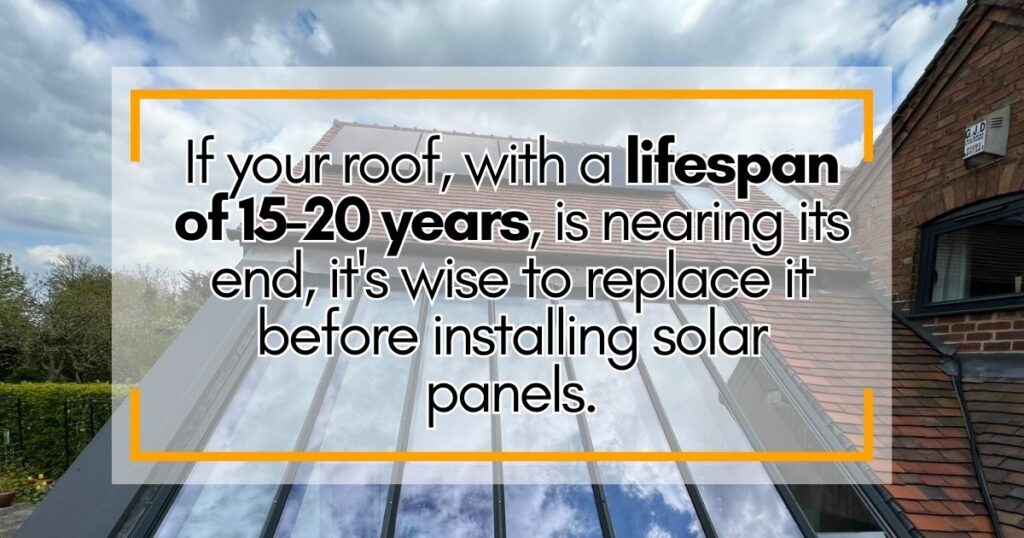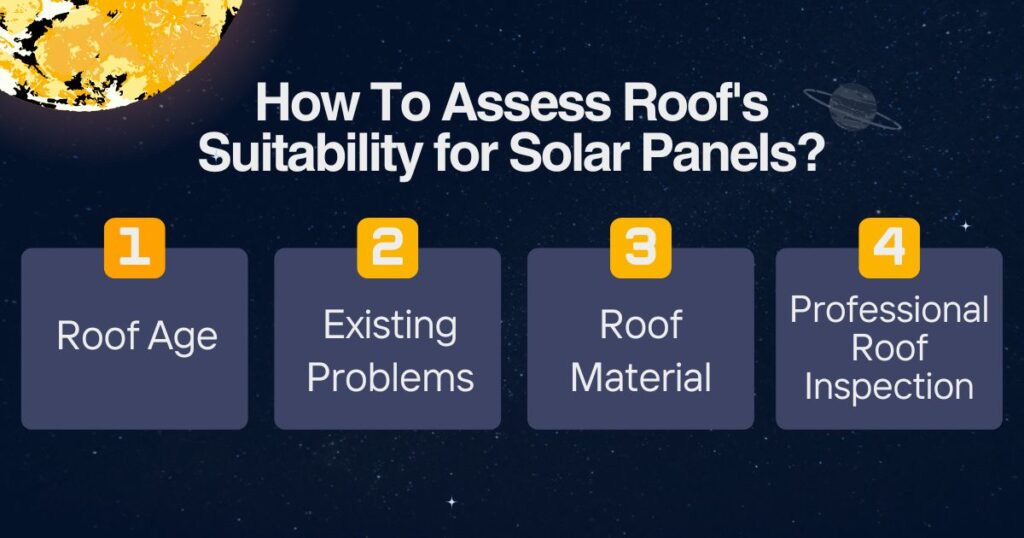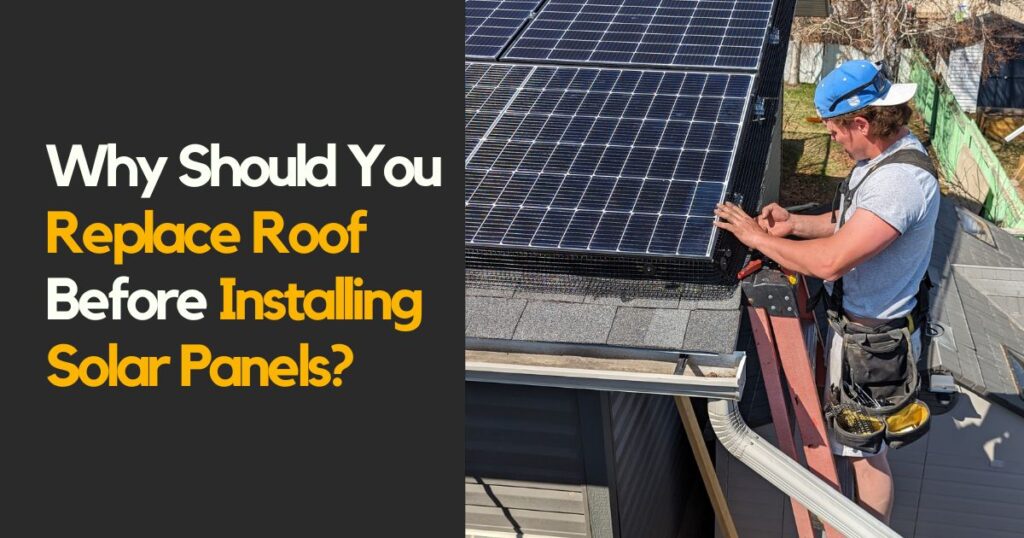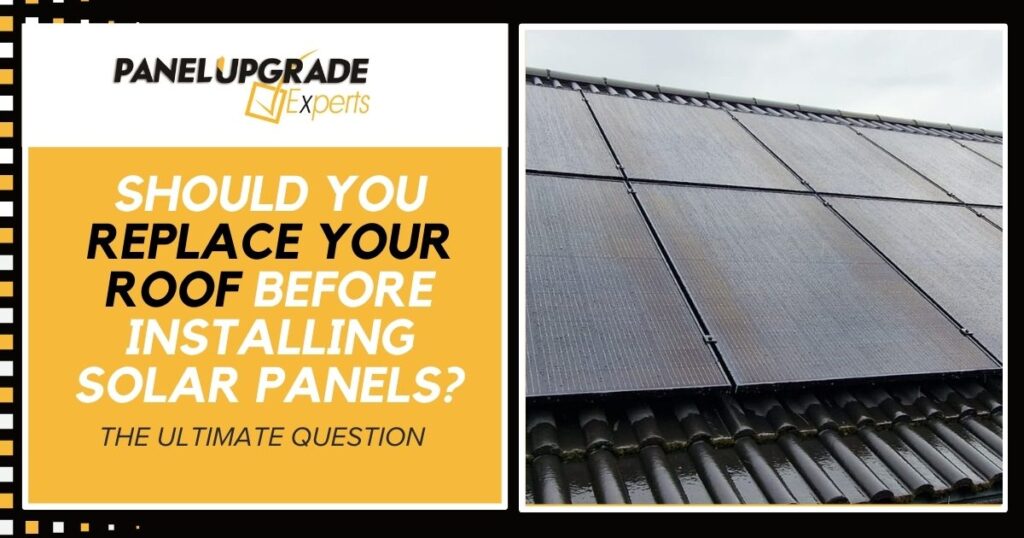Solar panels are becoming increasingly popular as a home improvement feature and a sustainable power source.
In Canada, for instance, the solar energy capacity grew from 0.6 GW in 2011 to 3.6 GW by the end of 2021, with projections of 35 GW by 2050.
No wonder, because aside from saving money on electricity, solar panels keep us from using fossil fuels that are environmentally harmful.
But here’s a catch before installing residential solar: You’ve got to take a good, hard look at your roof.
Why? Knowing roof issues beforehand helps streamline solar panel roof installations and avoid future problems.
Should you replace roof before installing solar panels? This blog will help you know the answer.
Let us guide you through the essentials of roof readiness for solar installation so you can make the best decisions.
Ready for straightforward tips and insights on embracing solar energy effectively?
Let’s get started!
What Is the Importance Of Roof Condition In Solar Panel Installation?
Due to the 25–30-year lifespan of solar systems, considering a home’s roof condition is crucial in the installation process.
Therefore, installing solar panels on a new or relatively new roof ensures that both the roof and solar system age concurrently, minimizing the need for disruptive and costly panel removal and reinstallation.
Fortunately, most residential roofs, particularly those made of asphalt shingles, have a lifespan of around 20 to 30 years, matching the solar panels’ lifespan.
But how do you know if you should replace roof before installing solar panels?

If a roof is nearing the end of its service life—generally considered around 15 to 20 years for most materials—it’s advisable to replace it before adding solar panels.
Ensuring roofs are new or in good condition beforehand will help avoid future hassles, additional expenses, and other issues.
For example, since a roof that is too old won’t be able to handle the weight of the panels or the installation process, problems like leaks and dents will manifest, leading to extensive repairs.
How To Assess Roof’s Suitability for Solar Panels?

Assessing the roof’s suitability for solar panels is critical before embarking on the journey to harness residential solar energy.
This evaluation is essential to ensuring that your investment in solar technology yields maximum benefits and avoids potential pitfalls.
When assessing whether your roof needs replacement, consider these key factors:
Roof Age:
- If your roof is relatively new or 5 to 10 years old, it’s likely in good condition for solar. Still, it’s best to seek professional advice for a concrete assessment.
- If you decide if should you replace roof before solar panel installation, consider those with a 20–25-year lifespan to match the 25–30-year life of the panels. With this, you probably won’t need to re-roof during your solar panel’s lifetime.
Existing Problems:
- Check for leaks, pooling water, overhang rots, corrosion, missing shingles, or any signs of structural weakness. Address any damage before proceeding with solar installation to avoid future complications.
- Roof slopes help move water and snow to gutters, but slopes unsuitable for solar installation will cause panels to block the flow and cause leaks. Also, a steep or flat roof can make installation hard and reduce sun exposure, so you’ll need special brackets to tilt the panels for better sunlight.
- It’s not ideal to install solar panels on your roof if it does not face south, is shaded, or has obstructions from trees. Consider trimming overhanging branches to improve sunlight exposure and enhance panel performance.
Roof Material:
- Most modern roofs can support solar panels, with metal being the most solar-friendly due to its easy, non-invasive installation. Asphalt shingles, green roofs, concrete, rubber, and tile (clay, ceramic) are also ideal. In contrast, wood, thatch, and slate roofs are not advisable due to their brittleness and fire hazards.
- Solar panels weigh about 40 pounds in addition to snow buildup, and some roofs or frameworks cannot handle this load and foot traffic during installation. Thus, ensure the roof material and structure can handle extra loads.
Professional Roof Inspection:
- A thorough inspection can identify potential issues and assess the roof’s remaining life. Professionals can give you a detailed report that covers the roof’s condition and orientation.
- Experts conducting thorough site surveys and roof mapping can identify early challenges, streamline permitting, optimize panel placement for efficiency, enhance safety, save costs, and prevent costly mid-project changes.
- For expert advice, consider engaging with professionals like Panel Upgrade Experts for guidance on whether you should replace roof before installing solar panels or not.
Evaluating critical factors will help you confirm if your roof is ready for solar panels, your investment is well-spent, and your system is long-lasting and efficient.
Why Should You Replace Roof Before Installing Solar Panels?

If you replace the roof during the solar panel installation, you can avoid extra expenses later. Depending on your system’s size, it might cost between $1,500 and $6,000 for solar panel removal and reinstallation alone.
The total cost of the roof and solar panels could be around $30,000. However, you can get solar loans, home equity loans, or government incentives to help pay for these things.
It may sound like a steep price, but it’s a reasonable offer compared to doing the re-roofing work later.
Skipping the roof replacement beforehand could lead to higher costs, especially if you need to remove and reinstall the panels for roofing work in the future. Plus, you risk voiding your solar warranty if the panels are damaged during roof replacement.
Also, consider the savings from your solar panels, which can significantly offset initial costs. For example, reducing your electric bill can lead to substantial savings, like zero monthly bills and potentially up to $96,000 over the system’s operational years.
This upgrade can even boost your home’s market value, as new roofs and solar panels are attractive features for potential buyers.
Finally, service providers might offer discounts for bundling roof and solar installations, providing extra savings.
For this reason, engaging experts for installation guarantees quality work and maximizes benefits.
Replacing your roof before installing solar panels also goes beyond financial benefits.
A new roof enhances the longevity and performance of your solar system, ensuring they age together efficiently.
Since solar panels are sturdy, they can act as a protective layer for your roof, shielding it from the elements and potentially extending its life.
No wonder many homeowners find it makes sense to handle the roof and solar investments together, as long-term energy savings can effectively pay back the upfront costs.
What Are The Alternatives If You Don’t Have Enough Roof Space?
If your home is unsuitable for rooftop solar panels, ground-mounted systems offer a viable alternative, allowing you to harness solar energy without roof constraints.
Ground-mounted solar systems are great alternatives to get the most solar energy if you have issues with how your roof is angled or how much shade it gets.
These systems can be applicable in many ways, such as in landscaping, on canopy roofs, or in architectural design. With a ground alternative, you maintain the integrity of your roof and avoid the complexities of rooftop installations.
Ultimately, expert advice will guide you to make an informed decision that aligns with your energy goals and property characteristics, ensuring a successful solar energy project.
With professional consultation, you can explore all available options and ensure the best solution you need. Experts can offer insights into the most effective installations and potential discounts for combined services, enhancing the value of your investment.
Best Rooftop Solar Panels With Panel Upgrade Experts
We are your trusted local partner in transforming Canadian homes with efficient residential solar integration.
Our knowledge of Canada’s unique roofing systems and weather makes us your best local experts for seamless solar panel installation.
We’ll meticulously examine your roof, considering its orientation, shading, and structural integrity, to design a unique solar solution.
By choosing Panel Upgrade Experts, you’re investing in a sustainable future, reducing energy bills, and enhancing your bankability.
Act now! Contact Panel Upgrade Experts for a tailored solution for your Canadian home.
Embrace the change with us and join the growing number of Canadian homeowners who benefit from our specialized, local knowledge in solar integration.
Final Thoughts
Using solar power is a great way to live sustainably. The increasing use of solar energy in Canada proves its popularity and positive environmental impact.
To know if should you replace roof before installing solar panels, it’s crucial to consider how long they last and their compatibility. You should also check if your roof needs replacing to ensure a smooth installation.
It’s not easy to decide whether or not to replace the roof before installing solar panels. While we recommend replacing the roof first for a better solar setup, others may have different opinions. If your roof isn’t suitable, ground-mounted systems are a good alternative.
Remember, rooftop solar panels are profitable investments that add value to your home. So, let experts assess your property and provide accurate solar quotes.
FAQs
When should I replace my roof?
You should replace your roof when it’s around 20-30 years old or showing signs of significant wear, such as leaks, missing shingles, or extensive damage. It should be before installing solar panels if an inspection suggests or if they’re nearing the end of their lifespan.
What type of roof is best for solar panels?
Consider a metal roof if you live in a snowy area like Canada. Metal roofs are durable, have a long lifespan, allow ease of installation, and provide a sturdy base for mounting solar panels.
3. How often do I need to replace my roof and solar panels?
Most roofs and solar panels need replacement every 20-30 years. It’s ideal to synchronize their replacement to minimize disruption and costs. Expert assessment can help determine the exact timing, ensuring your roof and solar panels are in matching optimal condition throughout their service lives.
Are solar panels suitable for rooftops?
Yes, solar panels are suitable for rooftops due to the optimal exposure to sunlight. However, the roof’s condition, material, and angle are crucial factors to consider. A well-maintained, sturdy roof with minimal shading is ideal for maximizing the efficiency and effectiveness of solar panel installations.

